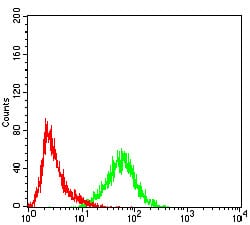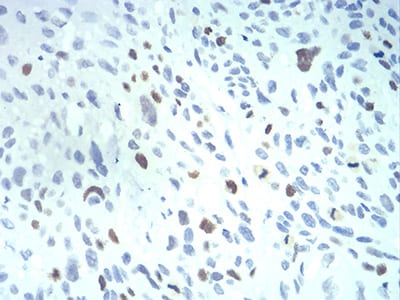





| WB | 咨询技术 | Human,Mouse,Rat |
| IF | 咨询技术 | Human,Mouse,Rat |
| IHC | 1/200 - 1/1000 | Human,Mouse,Rat |
| ICC | 1/200 - 1/1000 | Human,Mouse,Rat |
| FCM | 1/200 - 1/400 | Human,Mouse,Rat |
| Elisa | 1/10000 | Human,Mouse,Rat |
| Aliases | QIP2; RCH1; IPOA1; SRP1alpha |
| Entrez GeneID | 3838 |
| clone | 1E8B7 |
| WB Predicted band size | 58kDa |
| Host/Isotype | Mouse IgG1 |
| Antibody Type | Primary antibody |
| Storage | Store at 4°C short term. Aliquot and store at -20°C long term. Avoid freeze/thaw cycles. |
| Species Reactivity | Human,Mouse |
| Immunogen | Purified recombinant fragment of human KPNA2 (AA: 1-530) expressed in E. Coli. |
| Formulation | Purified antibody in PBS with 0.05% sodium azide |
+ +
以下是3篇与KPNA2抗体相关的文献及其摘要内容概括:
---
1. **文献名称**: *KPNA2 promotes tumorigenesis and metastasis in lung adenocarcinoma by enhancing STAT3 activation*
**作者**: Wang Y, et al.
**摘要**: 本研究通过免疫组化(使用KPNA2抗体)发现KPNA2在肺腺癌组织中高表达,其表达水平与患者预后不良相关。实验表明KPNA2通过促进STAT3信号通路激活驱动肿瘤转移,抗体检测结果支持其作为潜在治疗靶点。
---
2. **文献名称**: *Nuclear transport protein KPNA2 interacts with ATF2 to regulate tumor progression in triple-negative breast cancer*
**作者**: Li H, et al.
**摘要**: 研究利用KPNA2抗体进行Western blot和免疫荧光实验,证实KPNA2在三阴性乳腺癌中异常高表达,并与转录因子ATF2相互作用,促进肿瘤细胞增殖和侵袭。抑制KPNA2可显著降低体内外肿瘤生长。
---
3. **文献名称**: *KPNA2 as a diagnostic marker for early-stage hepatocellular carcinoma: A comparative immunohistochemical study*
**作者**: Chen X, et al.
**摘要**: 通过对比分析肝癌组织与正常肝组织的KPNA2抗体染色结果,发现KPNA2在早期肝细胞癌中特异性高表达,其敏感性和特异性优于传统标志物AFP,提示其作为早期诊断生物标志物的潜力。
---
如需获取全文或更多文献,建议通过PubMed或ResearchGate以关键词“KPNA2 antibody”+"cancer"/"diagnosis"进一步筛选。
KPNA2 (Karyopherin Alpha 2), also known as importin subunit alpha-1. is a member of the importin α family responsible for nucleocytoplasmic transport. It facilitates the nuclear import of proteins containing classical nuclear localization signals (NLS) by forming a heterodimeric complex with importin β1. KPNA2 plays critical roles in regulating cell cycle progression, gene expression, and signal transduction by mediating the nuclear transport of transcription factors (e.g., p53. c-Myc) and other cargo proteins. Its expression is tightly controlled during normal cellular processes but is frequently dysregulated in cancers. Overexpression of KPNA2 has been linked to tumorigenesis, metastasis, and poor prognosis in multiple cancers, including breast, lung, ovarian, and hepatocellular carcinomas, making it a potential oncogenic biomarker and therapeutic target.
KPNA2 antibodies are widely used in research to detect protein expression, localization, and interactions. They enable applications such as Western blotting, immunohistochemistry, immunofluorescence, and co-immunoprecipitation. These antibodies help elucidate KPNA2's role in disease mechanisms, particularly its involvement in cancer progression through aberrant nuclear transport of oncoproteins. Recent studies also explore KPNA2's relevance in viral infections, neurodegenerative diseases, and autoimmune disorders. Commercial KPNA2 antibodies are typically developed against specific epitopes, with validation across species and sample types. Researchers must verify antibody specificity using knockout controls due to homology among importin α isoforms. As interest grows in targeting nuclear transport pathways for therapy, KPNA2 antibodies remain vital tools for diagnostic and functional studies.
×